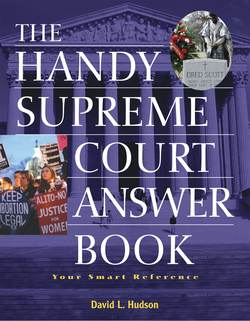Читать книгу The Handy Supreme Court Answer Book - David L Hudson - Страница 18
На сайте Литреса книга снята с продажи.
JUDICIAL REVIEW AND JUDICIAL INDEPENDENCE Did the framers agree on the power of judicial review?
ОглавлениеNo, the Founding Fathers did not agree on the power of judicial review—the power of the Supreme Court to review the constitutionality of laws and regulations. The Federalists believed in establishing a strong, central government. One such Federalist, Alexander Hamilton, the nation’s first secretary of the Treasury, argued forcefully for the power of judicial review in one of his Federalist Papers (#78). The Federalist Papers were a series of essays published anonymously under the pen name “Publius” by Hamilton, James Madison, and John Jay to support the newly drafted Constitution and the new central government. In 1789, Madison argued for the addition of a Bill of Rights to the Constitution, and wrote that the Bill of Rights would give the judiciary a “check” on legislative encroachments on individual liberties.
Pro-Con: Judicial Review
Pro-Judicial Review (Federalist Papers): “It is far more rational to suppose, that the courts were designed to be an intermediate body between the people and the legislature, in order, among other things, to keep the latter within the limits assigned to their authority. The interpretation of the laws is the proper and peculiar province of the courts. A constitution is, in fact, and must be regarded by the judges, as a fundamental law. It therefore belongs to them to ascertain its meaning, as well as the meaning of any particular act proceeding from the legislative body.”
Anti-Judicial Review (Anti-Federalist Papers): “The supreme court under this constitution would be exalted above all other power in the government, and subject to no control. The business of this paper will be to illustrate this, and to show the danger that will result from it. I question whether the world ever saw, in any period of it, a court of justice invested with such immense powers, and yet placed in a situation so little responsible. Certain it is, that in England, and in the several states, where we have been taught to believe the courts of law are put upon the most prudent establishment, they are on a very different footing.”
Others, known as Anti-Federalists, believed that the new Constitution concentrated too much power in the new, federal government. They wanted to keep the power with the individual state governments. Robert Yates, a leader from New York, wrote a series of essays called the Anti-Federalist Papers under the pen name “Brutus.” In one of these, he attacked the concept of judicial review as residing too much power in the judiciary.
